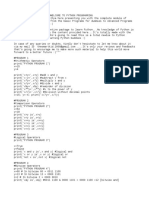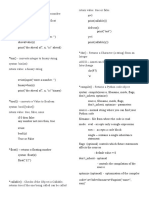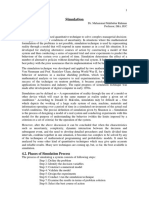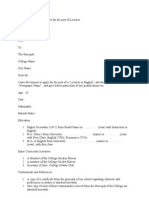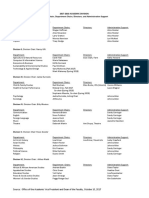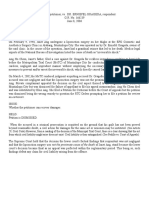x = 10 # Integer # I t e r a t i n g with range # F u n c t i o n with return
x = 3.14 # Float for i in range (3) : def square ( x ) :
x = " Hello " # String print ( i ) return x ** 2
x = True # Boolean # I t e r a t i n g through a list print ( square (4) ) # Output : 16
colors = [ " red " , " green " , " blue " ] # F u n c t i o n without return
for color in colors : def d is pl a y_ me ss a ge () :
print ( color ) print ( " Hello ! " )
age = 25 # int # I t e r a t i n g through a string result = d is pl ay _ me ss a ge () # Prints " Hello !" but result is
pi = 3.14159 # float for char in " Python " : None
name = " Aiden " # str print ( char ) print ( result ) # Output : None
is_student = True # bool
count = 0 # Lambda f u n c t i o n
# Input example while count < 3: square = lambda x : x ** 2
name = input (" Enter your name : ") print ( count ) print ( square (5) ) # Output : 25
print ( f " Hello , { name }!") count += 1 # Lambda in built - in f u n c t i o n s
# Input as a number nums = [1 , 2 , 3 , 4]
age = int ( input (" Enter your age : ") ) # Convert input to int squared_nums = list ( map ( lambda x : x ** 2 , nums ) )
print ( f " You will be { age + 1} next year .") print ( squared_nums ) # Output : [1 , 4 , 9 , 16]
• break: Exits the loop immediately.
try :
# Correct indentation • continue: Skips the rest of the loop iteration.
# Code that may raise an e x c e p t i o n
if True :
except ExceptionType :
print (" This is indented .")
# Incorrect indentation ( will cause an error ) • pass: Does nothing; placeholder. # Code to handle the e x c e p t i o n
else :
# if True :
# E x e c u t e s if no e x c e p t i o n occurs
# print (" This is not indented correctly .")
finally :
# E x e c u t e s r e g a r d l e s s of whether an e x c e p t i o n occurs
# break example
for i in range (5) :
x = 10 if i == 3:
y = 3 break
try :
print ( x + y ) # 13 print ( i )
result = 10 / 0
print ( x - y) # 7 # c o n t i n u e example
except Z e r o D i v i s i o n E r r o r :
print ( x * y ) # 30 for i in range (5) :
print ( " Cannot divide by zero ! " )
print ( x / y ) # 3.333... if i == 3:
print ( x // y ) # 3 continue
print ( x % y) # 1 print ( i )
print ( x ** y ) # 1000 # pass example
try :
for i in range (5) :
x = int ( " abc " ) # Will raise V a l u e E r r o r
if i == 3:
result = 10 / 0
pass
except Z e r o D i v i s i o n E r r o r :
print ( i )
• /: Division (returns a float) print ( " Cannot divide by zero ! " )
except ValueError :
print ( " Invalid input ! " )
• //: Floor division (discards remainder)
def function_name ( parameters ) :
• %: Modulus (remainder after division) # F u n c t i o n body
return output def check_p ositive ( num ) :
• **: Exponentiation if num < 0:
raise ValueError ( " Number must be positive ! " )
return num
def greet ( name ) : try :
return f " Hello , { name }! " print ( check _positiv e ( -5) )
a , b = 10 , 3 except ValueError as e :
print ( greet ( " Aiden " ) ) # Output : Hello , Aiden !
print ( a + b ) # 13 ( A d d i t i o n ) print ( e ) # Output : Number must be positive !
print ( a - b ) # 7 ( Subtraction )
print ( a * b ) # 30 ( M u l t i p l i c a t i o n ) Positional Arguments:
print ( a / b ) # 3.333... ( Division )
print ( a // b ) # 3 ( Floor D i v i s i o n ) try :
print ( a % b ) # 1 ( Modulus ) def greet ( fname , lname ) :
age = int ( input ( " Enter your age : " ) )
print ( a ** b ) # 1000 ( E x p o n e n t i a t i o n ) print ( f " Hello , { fname } { lname }! " )
except ValueError :
print ( " Please enter a valid number ! " )
greet ( " John " , " Doe " ) # Hello , John Doe !
else :
print ( " Your age is : " , age )
x , y = 10 , 20
Default Arguments:
print ( x > 5 and y < 30) # True
print ( x > 15 or y < 30) # True
print ( not ( x > 5) ) # False def greet ( fname , lname = " Smith " ) : try :
print ( f " Hello , { fname } { lname }! " ) # Code that may raise an e x c e p t i o n
except ExceptionType :
greet ( " John " ) # Hello , John Smith ! # Code to handle the e x c e p t i o n
a , b = 15 , 10 else :
print ( a == b ) # False # E x e c u t e s if no e x c e p t i o n occurs
print ( a != b ) # True Keyword Arguments: finally :
print ( a > b ) # True # E x e c u t e s r e g a r d l e s s of whether an e x c e p t i o n occurs
print ( a <= b ) # False def greet ( fname , lname ) :
print ( f " Hello , { fname } { lname }! " ) Basic try-except Block:
greet ( lname = " Doe " , fname = " John " ) # Hello , John Doe !
a , b , c = 10 , 20 , 30 try :
# Combine a r i t h m e t i c and c o m p a r i s o n result = 10 / 0
print (( a + b ) > c ) # False Variable-Length Arguments: except Z e r o D i v i s i o n E r r o r :
# Combine c o m p a r i s o n and logical print ( " Cannot divide by zero ! " )
print (( a < b ) and ( b < c ) ) # True
def add_numbers (* args ) :
# Combine all three
return sum ( args ) Handling Multiple Exceptions:
print (( a + b == c ) or ( c % b == 0) ) # True
print ( add_numbers (1 , 2 , 3) ) # 6
try :
x = int ( " abc " ) # Will raise V a l u e E r r o r
result = 5 + 3 * 2 > 10 and not (4 % 2 != 0) Variable-Length Keyword Arguments: result = 10 / 0
# Step - by - step e v a l u a t i o n : except Z e r o D i v i s i o n E r r o r :
# 5 + 6 > 10 and not (0 != 0) print ( " Cannot divide by zero ! " )
# 11 > 10 and not False def print_details (** kwargs ) : except ValueError :
# True and True for k , v in kwargs . items () : print ( " Invalid input ! " )
# True print ( f " { k }: { v } " )
print ( result ) # True
print_details ( name = " John " , age =30)
# name : John def check_p ositive ( num ) :
# age : 30 if num < 0:
x = 10 raise ValueError ( " Number must be positive ! " )
if x > 5: return num
print ( " Greater than 5 " ) try :
if x % 2 == 0: # Positional arguments print ( check _positiv e ( -5) )
print ( " Even number " ) def add (a , b ) : except ValueError as e :
else : return a + b print ( e ) # Output : Number must be positive !
print ( " Odd number " ) print ( add (5 , 3) ) # Output : 8
grade = 85 # Default a r g u m e n t s
if grade >= 90: def power ( base , exponent =2) :
print ( " A " ) return base ** exponent • Lists: Ordered, mutable collections.
elif grade >= 80: print ( power (3) ) # Output : 9
print ( " B " ) print ( power (3 , 3) ) # Output : 27 • Tuples: Immutable ordered collections.
else : # Keyword a r g u m e n t s
print ( " C or lower " ) print ( power ( exponent =3 , base =2) ) # Output : 8
# Variable - length a r g u m e n t s • Sets: Unordered collections of unique items.
def multiply (* args ) :
result = 1 • Dictionaries: Key-value mappings for efficient re-
for num in args : trieval.
• for: Iterates over sequences like list, range, or str. result *= num
return result
• while: Repeats while a condition is True. print ( multiply (2 , 3 , 4) ) # Output : 24 • append(item): Add an item to the end.
• remove(item): Remove the first occurrence of an item.
• sort(): Sort the list in ascending order. • .writelines(iterable): Writes a list of strings.
class Animal :
def __init__ ( self , name ) :
self . name = name
my_list = [1 , 2 , 3] dog = Animal ( " Dog " )
with open ( " example . txt " , " w " ) as file :
my_list . append (4) # [1 , 2 , 3 , 4] print ( dog . name ) # Output : Dog
file . write ( " First line \ n " )
my_list . remove (2) # [1 , 3 , 4] file . write ( " Second line \ n " )
my_list . sort () # [1 , 3 , 4]
class Animal :
def speak ( self ) :
with open ( " example . txt " , " w " ) as file : return " I make a sound "
• count(item): Count occurrences of an item. file . write ( " Automatic closure example . " ) class Dog ( Animal ) :
def speak ( self ) :
• index(item): Find the first index of an item. return " Woof ! "
dog = Dog ()
• .seek(offset, whence): Move pointer. print ( dog . speak () ) # Output : Woof !
my_tuple = (4 , 5 , 6)
print ( my_tuple . count (5) ) # 1 • .tell(): Get current position.
print ( my_tuple . index (6) ) # 2 class Dog :
def speak ( self ) :
return " Woof ! "
with open ( " example . txt " , " r " ) as file : class Cat :
• add(item): Add an item. print ( file . read (5) ) def speak ( self ) :
print ( file . tell () ) return " Meow ! "
file . seek (0)
• discard(item): Remove an item (no error if not present). animals = [ Dog () , Cat () ]
print ( file . read () ) for animal in animals :
print ( animal . speak () ) # Output : Woof ! Meow !
• union(other): Combine sets.
• Count Words in a File:
my_set = {1 , 2 , 3} class BankAccount :
my_set . add (4) # {1 , 2 , 3 , 4} def __init__ ( self , balance ) :
with open ( " example . txt " , " r " ) as file :
other_set = {3 , 4 , 5} self . __balance = balance # Private a t t r i b u t e
content = file . read ()
print ( my_set . union ( other_set ) ) # {1 , 2 , 3 , 4 , 5} def deposit ( self , amount ) :
words = content . split ()
self . __balance += amount
print ( " Word count : " , len ( words ) )
def get_balance ( self ) :
return self . __balance
account = BankAccount (100)
• keys(): Get all keys.
account . deposit (50)
• Copy File Content: print ( account . get_balance () ) # Output : 150
• values(): Get all values.
with open ( " source . txt " , " r " ) as src , open ( " dest . txt
• items(): Get all key-value pairs. " , " w " ) as dest :
dest . write ( src . read () ) • Iterators: Objects implementing iter () and next ()
methods.
my_dict = { " a " : 1 , " b " : 2}
• Generators: Special iterators created with functions
print ( my_dict . keys () ) # d i c t _ k e y s ([ ’ a ’, ’b ’])
using the yield keyword.
print ( my_dict . values () ) # d i c t _ v a l u e s ([1 , 2])
my_dict . pop ( " b " ) # Removes " b ": 2 import math
print ( my_dict ) # { ’ a ’: 1} print ( math . sqrt (16) )
from math import sqrt
print ( sqrt (25) ) class Counter :
import random as rnd def __init__ ( self , low , high ) :
print ( rnd . randint (1 , 10) ) self . current = low
• lower(): Converts all characters to lowercase.
self . high = high
def __iter__ ( self ) :
• upper(): Converts all characters to uppercase. return self
import math def __next__ ( self ) :
• capitalize(): Capitalizes the first character. print ( math . pi ) if self . current > self . high :
print ( math . ceil (4.2) ) raise StopIteration
else :
value = self . current
s = " Hello , World ! " self . current += 1
print ( s . lower () ) # hello , world ! return value
# m y _ m o d u l e . py
print ( s . upper () ) # HELLO , WORLD ! counter = Counter (1 , 5)
def greet ( name ) :
print ( s . capitalize () ) # Hello , world ! for num in counter :
return f " Hello , { name }! "
print ( num )
# Main file
Syntax: string[start:end:step] import my_module
print ( my_module . greet ( " Aiden " ) )
s = " Hello , World ! " def count () :
print ( s [7:12]) # " World " yield 1
print ( s [:: -1]) # "! dlroW , olleH " ( r e v e r s e d ) yield 2
• Random Integers: random.randint(a, b) generates a ran- yield 3
dom integer between a and b. for num in count () :
print ( num )
• f-strings: Introduced in Python 3.6. • Random Floats: random.uniform(a, b) generates a ran-
dom float between a and b.
• format(): Uses placeholders.
squares = ( x **2 for x in range (5) )
• Random Choices: random.choice(sequence) selects a ran- for square in squares :
dom element from a sequence. print ( square )
name = " Aiden "
print ( f " My name is { name }. " )
import random
Use open() to open a file: print ( random . randint (1 , 10) ) # Random integer
print ( random . uniform (1.5 , 5.5) ) # Random float
• Modes: colors = [ " red " , " blue " , " green " ]
print ( random . choice ( colors ) ) # Random color
– "r": Read (default).
– "w": Write (overwrites file).
• random.shuffle(sequence): Shuffles a sequence in place.
– "a": Append (adds to existing content).
– "x": Create a file (fails if file exists). • random.sample(sequence, k): Selects k unique elements.
– "b": Binary mode.
– "t": Text mode (default).
nums = [1 , 2 , 3 , 4 , 5]
random . shuffle ( nums )
print ( nums )
file = open ( " example . txt " , " w " )
sample = random . sample ( nums , 3)
file . write ( " Hello , file ! " )
print ( sample )
file . close ()
• .read(): Reads entire content. • Simulating Dice Rolls:
• .readline(): Reads one line at a time. rolls = [ random . randint (1 , 6) for _ in range (5) ]
print ( " Dice rolls : " , rolls )
• .readlines(): Reads all lines into a list.
• Random Password Generator:
with open ( " example . txt " , " r " ) as file :
content = file . read () import string
print ( content ) password = ’ ’. join ( random . choices ( string .
ascii_letters + string . digits , k =12) )
print ( password )
• .write(content): Writes a string.




















































